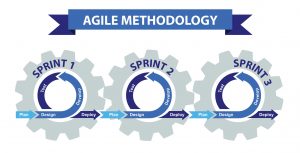USF Health Seeks CAHIIM Accreditation
Health informatics is a fast-growing field ideal for professionals with technology skills and a desire to work in healthcare. Students looking to enter a health informatics program face a wide range of choices on where to earn their graduate degree.
The University of South Florida’s online Master of Science in Health Informatics is currently in “candidacy status” with the Commission on Accreditation for Health Informatics and Information Management (CAHIIM). The program, which also features a concentration in Healthcare Analytics, is part of the nationally-ranked USF Health Morsani College of Medicine.
The Morsani College of Medicine was the first medical school in the nation to offer a Master of Science in Health Informatics program 100% online.
Accreditation by CAHIIM is the next step for a USF program that has grown rapidly through the years. With CAHIIM accreditation, the school will welcome the agency’s quality monitoring process, quality improvement tools and data on health informatics program trends.
Why Is CAHIIM Accreditation Important?
Students entering a graduate health informatics program that is CAHIIM accredited can know they are going into a highly regarded program that meets rigorous industry and educational standards. For those who wish to enter health information management, graduation from a CAHIIM-accredited program is necessary for eligibility to take AHIMA professional HIM certification exams.
For students, attending a CAHIIM-accredited program may also improve their marketability for employment post-graduation. They are assured they will receive the knowledge and skills to help prepare them to succeed. Experts at CAHIIM also do the work for students in terms of evaluating a program. They ensure that the institution, faculty and curriculum meet rigorous standards. It’s a beneficial designation for students looking to attend the best programs in the country.
For universities, accreditation sets them up for continuous improvement, as programs are routinely evaluated. They also receive access to extra benefits such as assessment tools for outcome metrics and trend data.
How Has CAHIIM Accreditation Evolved?
CAHIIM is a subsidiary of the American Health Information Management Association (AHIMA) and was formed in 1928. In 1935, the organization began developing a curriculum model for medical record librarians, now considered the beginning for health information management (HIM). As health informatics became a larger part of HIM, CAHIIM incorporated health informatics into the scope of HIM program evaluation.
CAHIIM defines HIM as the practice of managing medical information vital to providing quality patient care. This includes data governance and the “acquisition, analysis, and protection of digital and traditional types of information.”
CAHIIM defines health informatics as an inter-professional specialty “at the confluence” of health, information science and technology, and social and behavioral science. They list health informatics as involving the use of data for clinical care, scientific inquiry, decision making and problem-solving that leads to improved patient health and safety.
Universities receive accreditation in two areas:
- Institutional level accreditation allows a school to provide students federal financial aid, graduate education and grants them the ability to transfer credits from other accredited institutions.
- Programmatic accreditation is a separate designation given to individual programs in specific areas. CAHIIM falls into this second area.
How Does CAHIIM Evaluate a Program?
In evaluating a program, CAHIIM ensures that schools meet the highest standards for HIM and health informatics education. To meet CAHIIM health informatics accreditation standards, experts evaluate a program in a range of areas. They include:
- Sponsorship – The educational institution offering the program must have accreditation by an organization recognized by the U.S. Department of Education
- Systematic planning – This includes evaluation of the program’s mission and having measurable program outcomes that evaluate program effectiveness
- Program autonomy and governance – This includes evaluation of program leaders and faculty qualifications and performance
- Program curriculum – Curriculum is evaluated along many lines, including how it supports the program mission and whether it incorporates up-to-date information on health informatics issues and technology
Learn from a Reputable Medical School, 100% Online
Faculty at USF Health includes experienced medical professionals and information technology experts who work in the health informatics field. USF Health also is an Approved Education Partner by the Healthcare Information and Management Systems Society (HIMSS) and a member of the HIMSS Academic Organizational Affiliate (AOA) program. Visit the Master’s in Health Informatics program page for more information about accreditation, curriculum and the online application process.




